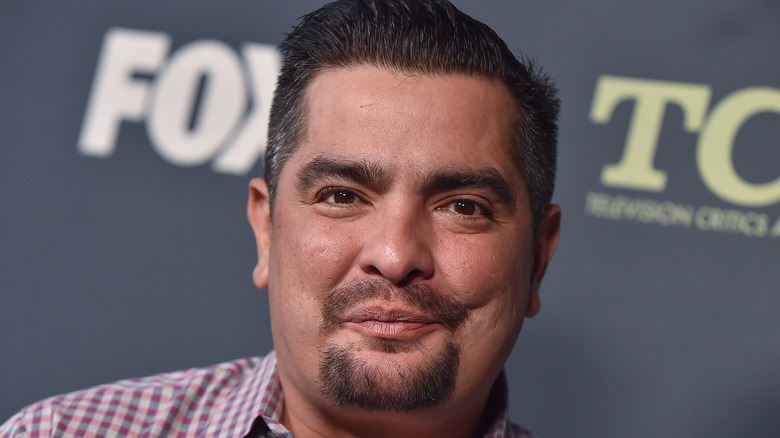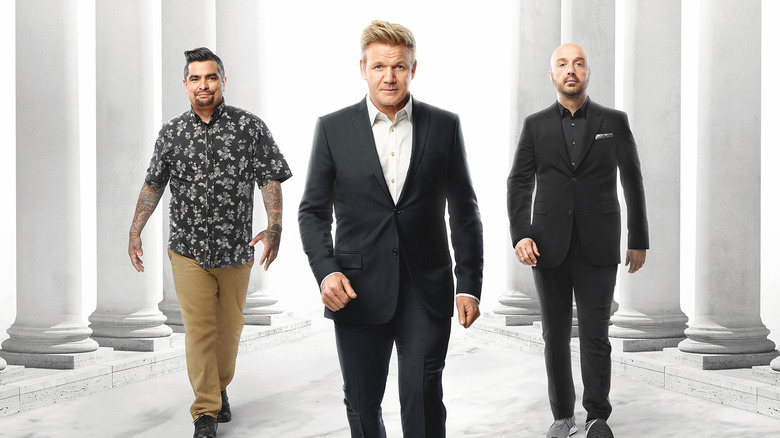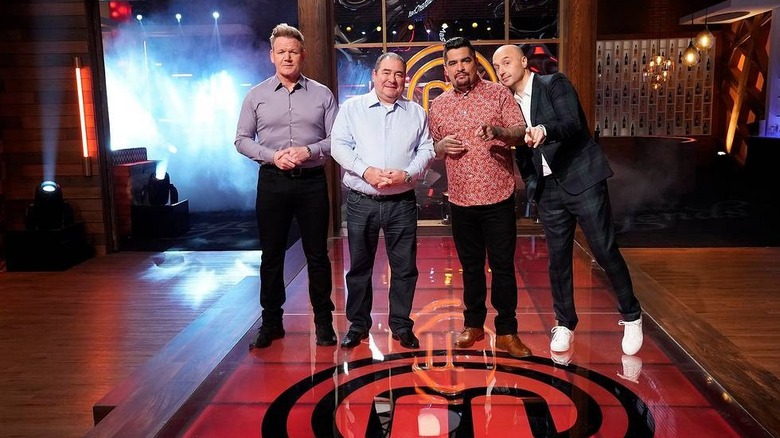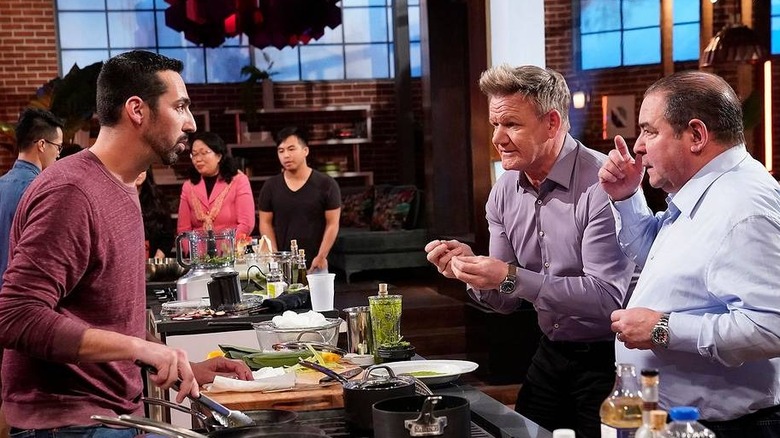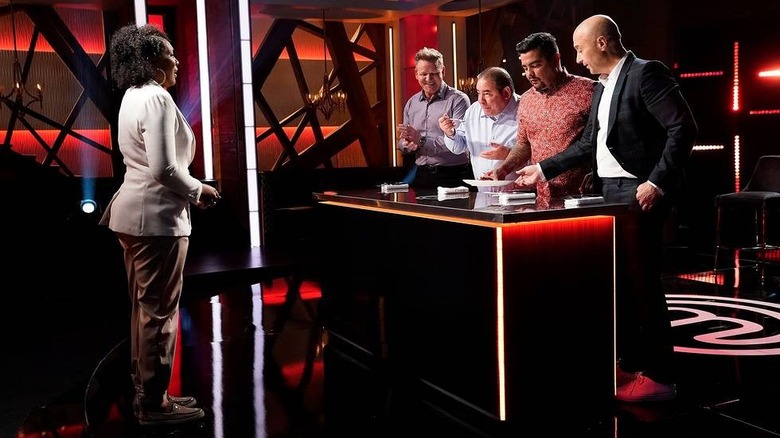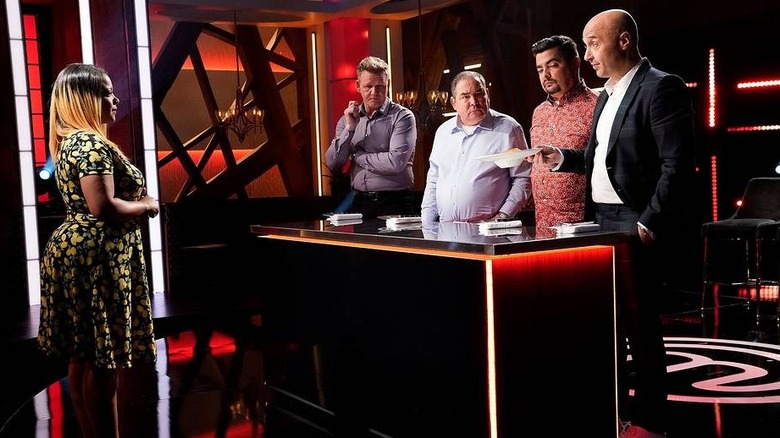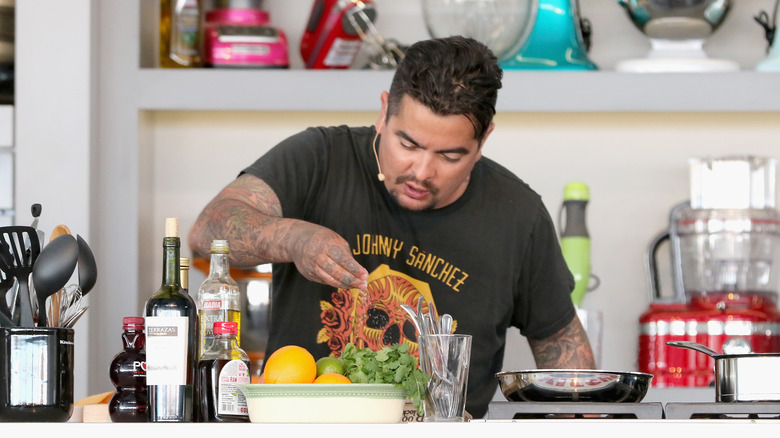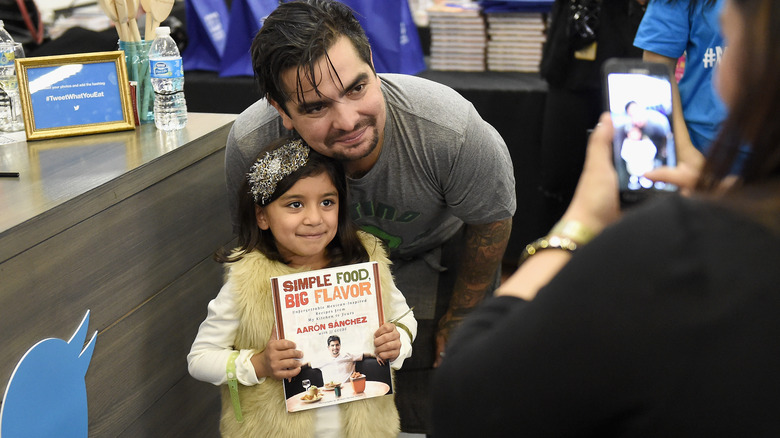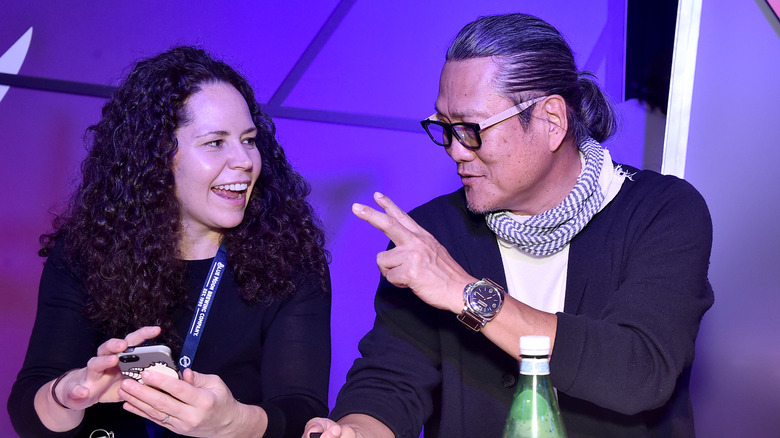Aarón Sánchez Talks MasterChef: Legends And Cooking Competitions - Exclusive Interview
Each season cooking competition shows are looking to stand out. "MasterChef: Legends" is the latest iteration pulling together some of the biggest names in the food industry to mentor a roster of 15 home cooks. Mashed sat down with Chef Aarón Sanchez to talk about joining co-hosts Gordon Ramsay and Joe Bastianich with guest judges such as Emeril Lagasse, Paula Deen, Roy Choi, Nancy Silverton, and Iron Chef Marahasu Morimoto to weigh in on the contestant creations. A household name himself, Sanchez started on the "MasterChef" series in 2017 and starred in multiple Food Network shows, including as a judge on "Chopped" and "Chopped Junior."
This "MasterChef Legends” season is poised to present plenty of chances for learning from the kitchen veteran. A third-generation cookbook author, Sanchez follows in the culinary path forged by his mother Zarela Martínez, who the New York Daily News called a "pioneer" for elevating Mexican cuisine in the U.S. thanks to her New York-based restaurant. The Texas-born chef also cemented his position as a leader in Mexican cuisine, as a restauranteur, author, and the host of Cooking Channel's Emmy-nominated series, "Taco Trip."
He understandably has some strong opinions about Mexican food — and the all-too–common misconceptions about the ancient traditions. Sanchez told us how mentorship is a vital passion he has, both on and off-screen. To encourage diversity in the kitchen, Sanchez founded the Aarón Sánchez Scholarship Fund, providing scholarships and ongoing mentorship for aspiring chefs from the Latin community.
Aarón Sánchez talks about what fans can expect from MasterChef: Legends
It seems every year the stakes are increasing on "MasterChef," so we really wanted to know what you were looking forward to in this new "MasterChef: Legends" format.
Yes. I mean, we're in a very good position, in the sense that this is season 11, and what we've created with the premier culinary competition in the world is an expectation of, first of all, just great food, but also seeing the growth and the maturation of these amateur cooks and turning them into professionals. I think that's what makes us very unique and the idea of building upon what we've already done. There's pressure involved, obviously, because you want to make sure it's getting bolder and better every year, right? And we thought this year collectively, as a group, that it would be great to have, in essence, a fourth judge. Alongside of us are legends, who we consider colleagues and peers, but also that we admire immensely. So they're bringing in another layer of intensity to the competition, which I think is unequaled.
Is there any guest judge that you were really looking forward to working with, either for the first time or again this season?
Well, it's funny because everyone that was on a panel, I've met. No one was a stranger to me. So just because our world is, especially in our generation of chefs, we kind of know each other, whether from doing food events or just being social. But look, I can give you some highlights. I mean, Jonathan Waxman is somebody who I love. He's kind of like my culinary father. Morimoto, what can you say? I battled Morimoto in "Iron Chef" many, many years ago. Michael Mina was somebody that's amazing, who I just love his techniques and in his sort of French background. You have Sherry Yard, who's like the pastry diva of divas. Nancy Silverton, c'mon, I mean, you have this ... it just, it goes on and on and on. It's just all these people I admire so much and for their contributions and also just what they stand for. So we kind of curtail a lot of our challenges and what we're going to do based a lot on what our legends backgrounds are and what their style of food is, so how's it going to match.
As a TV and cooking competition veteran, what do you wish more people would know or see in terms of the dynamics of just being a host and a judge?
I think, first of all, what's important is that what makes "MasterChef," the premier culinary competition in the world, is because we mentor. So, even if you were to say, fall short, right, you get there fifth, sixth, top six, whatever it is, you still walk away with an enormous amount of confidence with the certainty that you want to get into the culinary world. So, that's gratifying. I want people to know that. It's not where in other competitions you have 10 minutes in front of us, your food sucks, bye-bye, there's no parting gifts.
Here [at MasterChef], it's a month process or however long it is. They're away from their families, so they're very much dedicated. A lot of these people leave their jobs to do this. It's the situation that we're very emotionally invested, and we want to see them, all of them, succeed. That's what I take a lot of gratification in knowing that I'm helping them secure their dream of being in the food world, even if they don't win the whole thing.
Judge Aarón Sánchez discusses what goes on behind-the-scenes at MasterChef: Legends
Is there anything that happens behind the scenes that maybe viewers don't get to see that you'd want to share?
I mean, look, it's very intense. We do a lot of tasting behind the scenes. So sometimes, you, as a viewer will see just three dishes come up, but the reality is that we taste everything hot. We taste everything as it comes out. We do it with a group of people that make sure that we're following all the rules and it's a fair game. The contestants are able to do some masterclasses where behind the scenes they're working on their cooking skills, their cutting skills, their sauteing, just some basic techniques to prepare them. Because we feel that would be unfair to throw them into the gauntlet without us determining where they're are, as far as the progression and their growth, etcetera. So we're very much invested in their mentoring and seeing them grow as cooks. Because the end result, for you as a viewer and for us as judges, to get great food and to see them get better and display the characteristics and the qualities that are needed to be a Top Flight Master Chef. So we're working with all those factors.
Do you have a memorable moment for "Master Chef" or any contestants that stand out in your mind?
Yeah, I mean, there's been so many. I know a couple of seasons ago, two seasons ago, there was a really, really special guy who won, Gerron [Hurt] who I really admired. I thought he came in initially really green, and he just got better and better. His motivations were sincere for winning. I think when you see that happening, and you see somebody that's an ex-school teacher and then becomes a master chef, it's just like, "wow." It's mind-blowing, and it's very heartfelt. Because we want to make sure that all the personalities that we deal with, some could be cocky, some could be a little bit timid, some can be kind of in the middle, and we want to bring out those qualities of them and not change them but make them better and maybe exploit them more. You can't be really timid when you're a chef sometimes. So, we got to try to build them up and say, "All right, we need some people to find your inner voice," kind of thing. You know what I mean?
Well, I would imagine that it's such a different scope as well, to not only have that kind of personality, but then do it in front of the camera with everyone looking and watching.
Yeah. Yeah. And initially, everyone comes in kind of wanting to be a little bit of a ham and show off a little bit. We totally support that, it's just, because that's your personality. But when it's go time, it's go time, you know what I mean? There's not a lot of time to be joking around when you have 45 minutes, and you have to do something pretty elaborate and delicious. So, we want a beautiful balance of both, seriousness and then their own personality shining through.
Judging alongside Gordon Ramsey on MasterChef: Legends was a learning experience for Aarón Sánchez
You've also talked about how much you admire working with Gordon Ramsay, both as a host and as an executive producer. What have you learned from working with fellow legends like Ramsay that maybe either you have taken away or that you would do differently?
I've done television for a long time, but I've never done it with a personality and a talent like Gordon. The fact that he's a chef, one of the more premier chefs in the world, and he's an executive producer, makes a big difference. Because he's the one that can make the decision of like, "Well, look, I don't think they're ready for souffles yet. Or I don't think they're ready for the restaurant challenge yet." So, he can really pump the brakes and then consult with us, as judges and producers, and say, "Look, I think we need to just take our time, so we get the best product out of them." I think that's one thing that I've learned from him immensely. I've learned from him how to be more judicious, and I think, a little bit more tactful with my time.
He gets a lot done in a day. It's very impressive to see that. He has an assistant with him at all times. He's on the phone to his restaurants. He's dealing with multiple different things at one time. But when the cameras go on, he's ready to go, always extremely well-prepared, high energy. He'll come in very early, pumped, ready to go. I'm like an old Chevy, it takes me a couple hours to get warmed up. You know what I mean? But when I get going, I get going. I'm like the guy that's sitting in my dressing room, kind of just having my coffee, trying to get up. Then he'll come in blasting after three green juices and two espressos. [He's] like, "Aaron, let's go, mate." I'm like, "Okay, take it easy. We'll get there." But it's an absolute pleasure. I respect and love him very much.
Aarón Sánchez shares what makes a MasterChef: Legends winner
Other than great food, which you hope that all the contestants are able to produce, what do you think really sets apart a contestant from merely a good cook to a great cook and a winner?
The palette. What we find a lot of times is contestants, initially, during the process, will cook dishes like they cook for their husband or their family or grandmother's recipe. Excuse me, which is very heartfelt, right? But it's very simple and it's very straightforward. So what really the characteristics, and the qualities that we look for, especially towards the latter part of it, is their evolution of their palette and understanding how to balance flavors and knowing what ingredients go with what, right? Because, they have book time when they're away. They have access to every cookbook in the world. They have access to cooking magazines. They can get ideas anywhere they want. So that's what I look for, is the progression and the layering of flavor and how to play with texture, acid, spice, cooking things well, all those things are very important, the decisions you make.
Aarón Sánchez says chefs often are as competitive in real life as they are on TV
Which speaks to chefs being known for being highly creative and sometimes volatile personalities or at least being in the kitchen makes for great television.
Exactly.
How much of that, of what we see on screen, is what it's like to actually work in a high-pressure kitchen?
I think it's very accurate. I think what ticks chef's off, especially me and Gordon ... Joe is Mr. Moneybags. We mess with him and call him, "A glorified waiter." But anyway, so what pisses us off is laziness. I'm okay with you making mistakes. Don't make the mistake again after we tell you, but when we see people not trying, that's what really ticks me off — and I know it pisses Gordon off, too. Because it's, you're just taking a shortcut. We have the best pantry anywhere on television, the "MasterChef" pantry. Then you want to come out and you want to make steak and potatoes, you know what I'm saying, and green beans.
It's like, "Dude, we got maitake mushrooms in there. We have chanterelles. We have truffles. We have white asparagus. I mean, we have every ingredient you can imagine." So, when we see that happen, that tends to tick us off. Like, "Come on guys, we're giving you cart blanche here to work with." I don't even get to work with some of these d*** ingredients. So I'm like, "I don't get to work with them and you do, why aren't you using them?" So yeah, it's intense. We're not afraid to tell people how we feel, that's the big part. You got to be a big girl and big boys, you know what I mean? Don't take it personal, it's a job. I'm sure coaches don't talk to their players all the time very sweet. You know what I mean?
Excellent point.
So, anyway. But I hope everyone tunes in. We're premiering tomorrow, which is going to be exciting. I think it's going to be a game-changer. It's going to be fireworks in the kitchen. I think people are going to fall in love with the legends. They're going to fall in love with the contestants and seeing the reactions when they see them. That's, for me, the biggest coolest thing, because they don't know who's going to come out that door. Then when they see that person, a lot of the contestants have a really strong affinity or an admiration for them. So, just when that moment, when the legend comes out and then they pan the camera to the contestants and they're like, "Whoa, Morimoto." That's the best part for me. That makes me happy.
Chef Aarón Sánchez knows his Mexican food
Switching gears here a little bit. Are there any myths about Mexican food that you'd like to set straight?
Absolutely. You got about three hours? I'll tell you in short order, but I mean, for a couple of different things. People need to understand that Tex-Mex is one thing — Mexican food's another. Mexican food is extremely complex, it's regional, just like any other culinary superpower. If you have something in Tuscany, it's very different from having something in Calabria, etcetera, etcetera. Same thing in Mexico. They're known for their signature dishes and styles of cooking in those particular areas. We have the Spanish influence that came in 1519 to Mexico to marry with the Mesoamerican diet, which is corn chili, squash beans, cacao, corn, obviously.
I just think people need to understand the complexity of the food and how far it goes back. I always give a lot of grief to Gordon because he's always like, "French and European cuisine's, like, the bomb." I'm like, "Okay dude, you guys were living in caves, bro, when indigenous people were making mole, 2,000 years ago. So, let's get it together here." He doesn't like when I do that, but it's awesome. And everything doesn't have cumin. I think cumin is overused in so many dishes. I live with my uncle, and I actually hide the cumin from him because he tends to overuse it. In Mexico, cumin is really only used for beans. That's like one of the few dishes that it's used, so.
What are some of the biggest mistakes that you see people make when they're cooking or ordering in Mexican food?
I think you got to know what you're looking for. I think it's always important to think about how food travels, obviously. If you're ordering something to-go, for instance, think about tortillas getting soggy, think about guacamole not being fresh, think about your salsa's being bright, having enough garnishes, and tortillas to order. Things like that make a big difference. If you're adventurous, try to get your meats marinated but not cooked. Cook them yourself. That's always a little tip. Yeah. And nothing's wrong with making your own taco party, you know what I mean, getting a bunch of different fixings. And by the way, you can go to goldbelly.com and find my taco kit that will be sent to you, if you would be so inclined.
Do you have any tips for readers who are trying to cook at home?
I think, get yourself a good cast iron skillet, get some sharp knives, make sure that you take care of them. Get good sea salt and good regular salt. Have an olive oil that you cook with and olive oil that you finish dishes with, a little more expensive. Always try to have citrus and chilies in your fridge and tortillas and cheese, that way you can make a quesadilla any time. That's what I do. I always have kimchi in my fridge. I can make a kimchi quesadilla, one of my favorites. So things like that.
Aarón Sánchez on creating opportunities in the kitchen
Latinos and especially women can be left out of the spotlight for their contribution to the industry. So as someone who's worked to increase diversity in kitchens, I want to hear your thoughts on where the industry is headed or where it needs to head.
Yeah. Well, you know my mom had a restaurant for 30 years, so my mom's a chef. In my current scholarship program, the Aaron Sanchez Scholarship Program, we're very conscious of having equal men and equal women in our program, because it's extremely important to me. I'm very tough on the women in the kitchens. Because I just go by the example of my mom gave, who never complained, and just was a single mom, raising twin boys and never complained. And had her dream of being the most influential Mexican chef in the country. So I'm a little tougher on the ladies, to be very honest, because that's just the way I grew up. But if you look in Mexico, yes, there's trained chefs all over Mexico. They're fantastic chefs, women that have their own restaurants.
Then, you have these cocineras. You'll have women from these little villages that are the best cooks in town. They're usually older ladies who are Indigenous people that make these amazing dishes, and it's a very much part of the Mexican culture. They're not necessarily chefs. They will never call themselves chefs. They're cocineras. They're cooks, and they make the most amazing food entrenched with history and flavor and just amazingness. So, that's a big thing. I think I see a lot more women attacking our industry and becoming leaders, which is way overdue. I think it needs to happen a lot more, to be honest. I like having a lot of women in my kitchens because it breaks all the machismo and all that stuff down, which I hate. I want to have a very harmonious, happy place to cook in because that reflects in the food.
Judge Aarón Sánchez says Iron Chef Morimoto was a contestant favorite
Is there anyone from the legends that has been, especially contestants, have been especially excited to see or work with?
I think, I mean Morimoto made a big impact. He's such a personality and he's so revered. He's like the original kind of gladiator, the kitchen gladiator. You know what I mean? So, when he comes out ... I mean he's 63 years old, 65 years old — he's been around a long time. He looks fantastic, golfs every day and all that kind of thing. The best skin ever. His skin, it's like you can new buff. I don't even know what it is. It's like the stuff you put on it on a surfboard. You know what I mean? I'm like, "I don't know what ... You just look great."
The new season airs on Wednesdays at 8:00 PM ET/PT on FOX. The all-new season, dubbed MASTERCHEF: LEGENDS, welcomes a variety of culinary all-stars, including Emeril Lagasse, Paula Deen, Roy Choi, Nancy Silverton, Iron Chef Morimoto and many more, to join hosts Gordon Ramsay, Aarón Sánchez, and Joe Bastianich as they guide 15 home cooks through a series of challenges with a $250,000 grand prize on the line.
